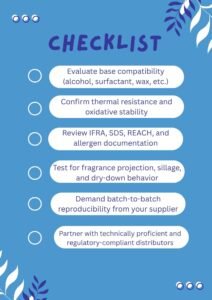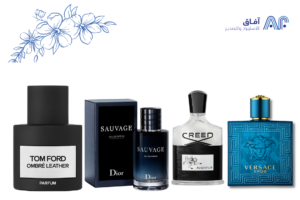Fragrance oils are not just an aesthetic enhancement — they are an integral part of a product’s sensory identity, especially in industrial manufacturing where performance, safety, and consistency are non-negotiable. From perfumes and personal care items to detergents, air fresheners, and fabric softeners, fragrance oils influence not only how a product smells but also how it performs, ages, and is perceived by end-users.
Industrial fragrance oil selection is a technical and strategic process. While the average consumer might judge a scent on how it smells from a bottle, manufacturers need to go far beyond that. The oil must be compatible with the formulation, stable under processing conditions, safe for consumer use, and reproducible at scale. This blog will walk you through how to approach fragrance oil selection for industrial use with precision, backed by Afaq’s experience in sourcing premium-grade oils from Europe.
Why the Right Fragrance Oil Matters in Industry
In an industrial context, choosing a fragrance oil is not about personal preference. It’s a matter of scientific compatibility, regulatory compliance, and brand reputation. The wrong oil can cause a variety of product issues:
- Phase separation or instability in emulsions.
- Discoloration of the final product.
- Oxidation and unpleasant scent changes over time.
- Poor scent throw or longevity post-production.
On the other hand, the right oil contributes to:
- Improved product performance and shelf stability.
- Enhanced sensory appeal and consumer satisfaction.
- Streamlined manufacturing with fewer quality control issues.
- Easier compliance with export and local safety regulations.
Afaq has seen firsthand how properly selected oils improve not just the product outcome but the efficiency of entire production systems.
Key Criteria When Choosing Fragrance Oils for Industrial Use
1. Compatibility with Product Base
A fragrance oil must be chemically compatible with the formulation it’s going into. For example:
- Alcohol-based perfumes and sprays need alcohol-soluble oils.
- Surfactant-heavy shampoos and body washes require oils that don’t cloud or separate.
- Alkaline detergents need oils that won’t break down or shift in scent.
- Wax-based applications like candles demand thermal stability and scent release.
Testing for emulsion stability, cloud point, and odor consistency across pH levels is essential before proceeding to bulk production.
2. Thermal and Chemical Stability
Processing conditions vary widely depending on the product. Oils used in soaps or hot-pour products may be exposed to high heat (above 70–80°C), while those in detergents may encounter caustic or oxidative environments. The ideal oil should:
- Maintain olfactive integrity after heating.
- Resist degradation from light, oxygen, or aggressive ingredients.
- Avoid forming residues or altering the viscosity of the final product.
Stability testing in real production conditions — including batch trials — is highly recommended.
3. Regulatory Compliance and Documentation
Every industrial fragrance oil must comply with regulations in the target market:
- IFRA Standards for usage levels in different product types (leave-on vs. rinse-off).
- REACH and CLP guidelines for chemical safety in the EU.
- Import and safety labeling regulations in Egypt and other countries.
Suppliers like Afaq ensure that each fragrance oil is delivered with a full technical dossier, including:
- IFRA Certificate of Conformity
- Safety Data Sheet (SDS)
- Allergen declaration
- Certificate of Analysis
This transparency simplifies quality audits, customer compliance checks, and international trade.
4. Scent Longevity and Projection
For many industrial products, especially those related to personal care and home environments, the longevity and strength of the fragrance are critical performance indicators. An oil must:
- Retain a noticeable, pleasant scent after application, drying, or use.
- Resist scent fading over time (during storage or on-shelf life).
- Be optimized for the desired fragrance load without overpowering or irritating users.
Balancing top, middle, and base notes is key to achieving a fragrance that performs well across different application types — whether used in creams, aerosols, or hot-wash conditions.
5. Batch Consistency and Scalability
Consistency is everything in industrial production. Imagine switching between batches of fragrance oil that vary in aroma or behavior — the risk to your brand’s reputation is enormous. That’s why:
- Oils must be manufactured under strict quality control systems.
- Suppliers should have the ability to replicate formulations at scale.
- Reliable forecasting and inventory availability are essential.
Partnering with a supplier like Afaq gives you assurance of supply, consistency across batches, and expert feedback during every production cycle.

Expanding the Industrial Applications of Fragrance Oils
Fragrance oils are now being used in a broader range of industrial contexts, including:
- Institutional cleaning products (e.g., for hospitals and hotels): where neutralizing chemical odors is as important as adding fragrance.
- Textile treatments: where long-lasting scent retention after multiple washes is essential.
- Car care products: with heat-resistant, non-irritating scents that linger on upholstery.
- Industrial air care systems: for ambient diffusers in malls, hotels, or office buildings.
Each application comes with unique technical requirements and user expectations, requiring tailored oil selection and technical support.
Common Mistakes to Avoid
- Choosing oils based solely on subjective scent preferences.
- Failing to test compatibility with product bases.
- Using oils from unknown suppliers lacking documentation.
- Neglecting scalability — assuming that small-batch performance will translate identically to industrial scale.
- Overlooking potential scent fatigue or consumer sensitivity to strong bases.
These pitfalls often result in reformulations, product recalls, or consumer dissatisfaction — all avoidable with upfront due diligence.
Afaq’s Role in Industrial Fragrance Solutions
Afaq has built its reputation as a leading fragrance oil supplier by supporting Egypt’s industrial manufacturers with:
- Direct imports from Europe’s most trusted fragrance houses: Düllberg Konzentra and Neo Parfum.
- Technical training and application testing support.
- A curated catalog of oils tailored to industrial categories.
- Full regulatory and documentation support with every order.
Whether you need assistance with compliance, testing, formulation, or sourcing — Afaq is your partner in scaling fragrance performance with confidence.
Fragrance oil selection for industrial use is part science, part logistics, and part artistry. It’s a decision that impacts everything from formulation stability to consumer perception. Manufacturers who invest time in selecting the right oil — and the right supplier — position their products for lasting success.
Afaq’s extensive experience, premium sourcing, and technical insight make it the ideal partner for fragrance-driven product excellence. With the right oil, your industrial product isn’t just effective — it’s memorable.




